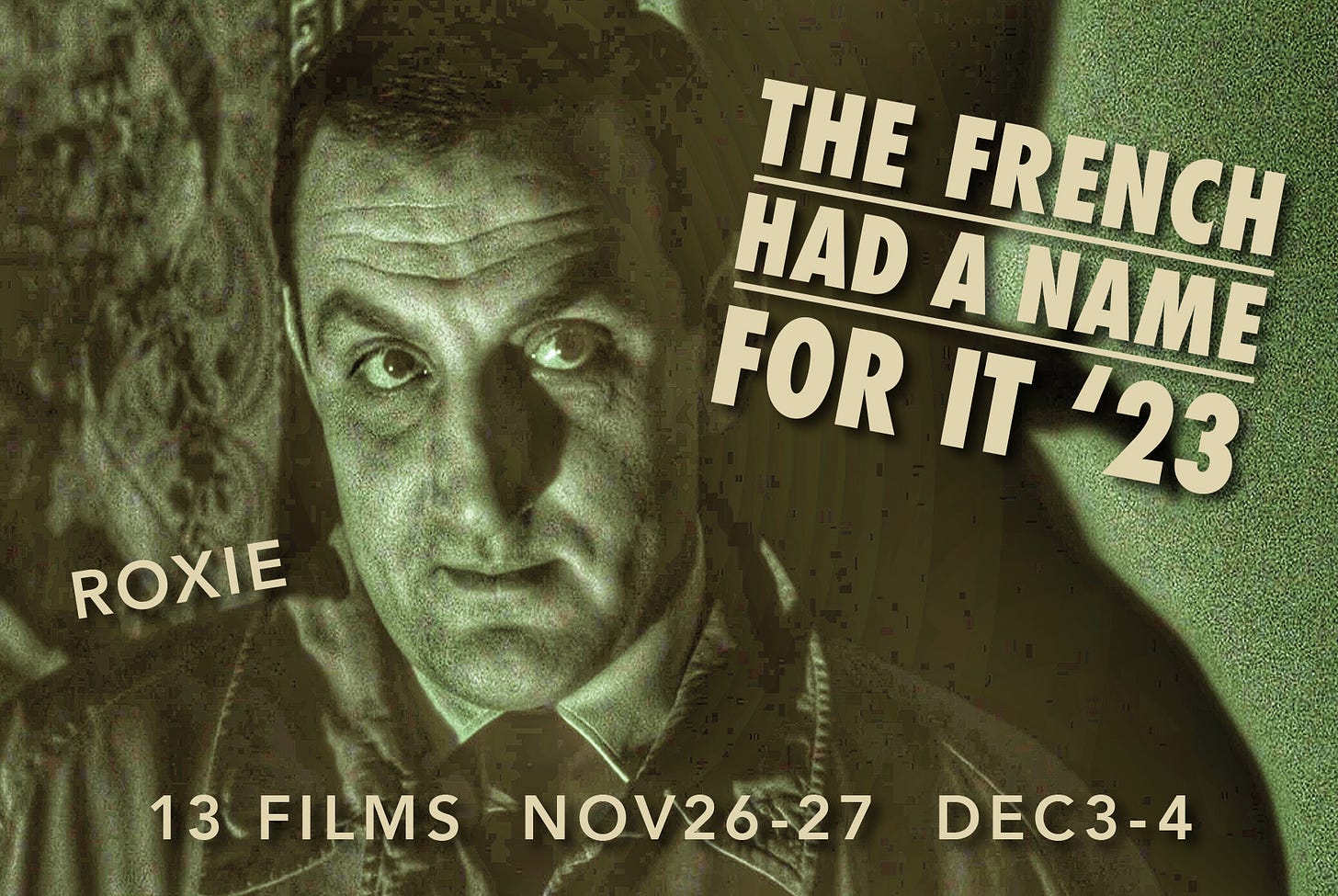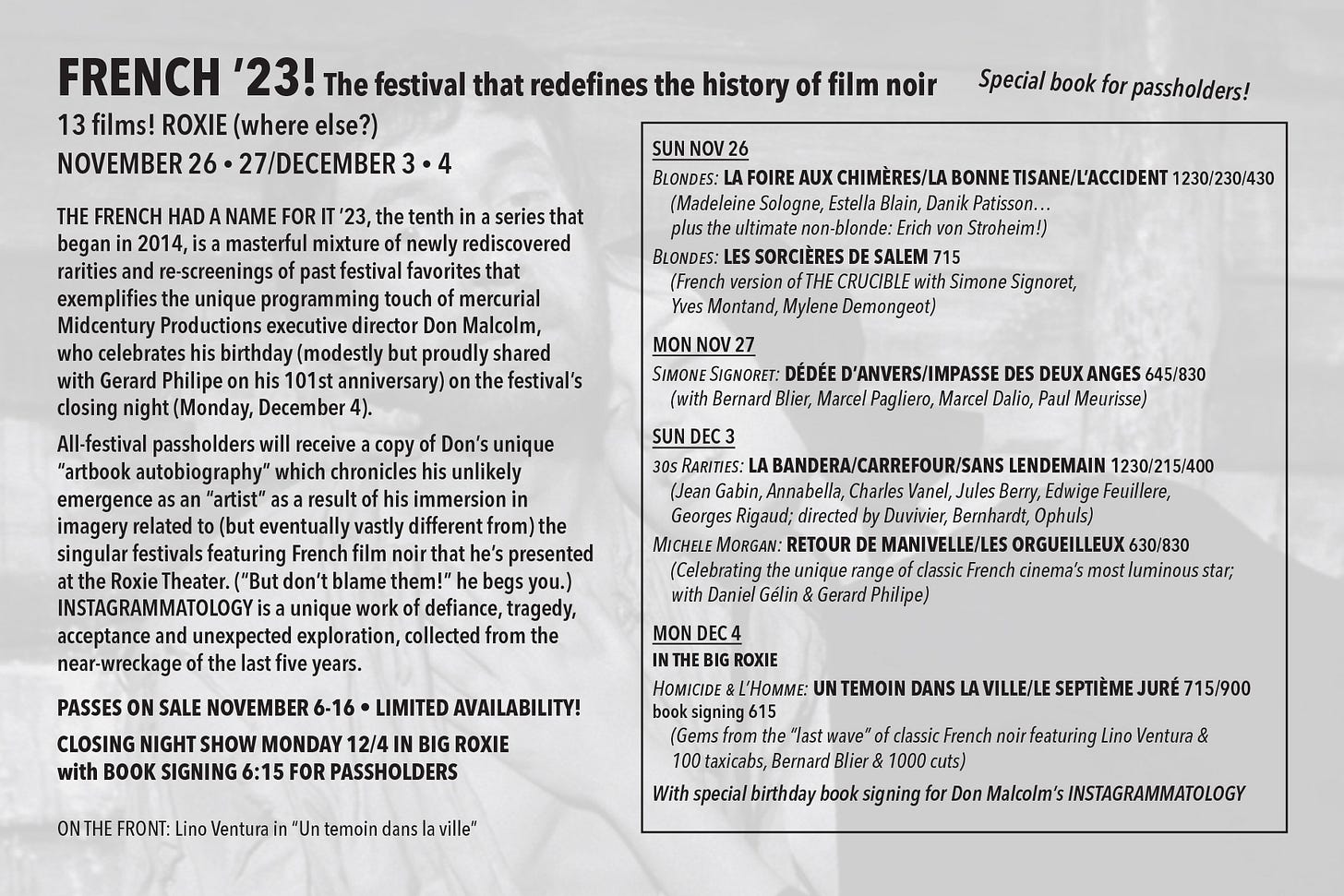THEY’VE taken to calling it “Noirvember” (the movie pundits and social media manipulators, who might just be too clever by half). This hijacking of the eleventh month has created a lot of talk—which is good—but it’s more heat than light in one very odd way…
…for all that talk, there are no noir festivals in “Noirvember.”
EXCEPT, of course, for us.
THE FRENCH HAD A NAME FOR IT remains the only sequential-format film noir festival in November (let’s remember the month’s real name at least once in awhile, shall we?). That’s been the case since 2014. While someday that’s bound to change, the fact is that we had “Noirvember” covered before it even existed. And we’re still the only game in town—in the world, actually.
SUNDAY “Noirvember” 26 is D-Day, zero hour, a cinematic inflection point (or whatever meme you prefer…) for the tenth FRENCH HAD A NAME FOR IT festival, bringing noir to the screen in a month where all the talk in the world has no other follow-up on the big screen. We have 13 films that will extend “Noirvember” into the next month as well (bonus days!) and once again we’ll show you that French noir contains four decades’ worth of its own darkly unique multitudes.
As always, big names are here. The glowering Lino Ventura, just coming into his own as a superstar; Simone Signoret, in three films, including one with Yves Montand not seen in America for more than sixty years. Jean Gabin, in the first of his “man on the run” personae; Michèle Morgan, playing two diametrically opposite characters.
But it’s not FRENCH HAD A NAME FOR IT, of course, without rarities and rarely-seen faces. We start on Sunday the 26th with three blondes—Madeleine Sologne, Estella Blain, Danik Patisson—who have more to offer than just fair-haired beauty. The first of these films, THE DEVIL & THE ANGEL, reminds us that the ultimate non-blonde, Erich von Stroheim, is all over French film noir, from the 1930s until his death in 1955—and his portrayal of the disfigured loner here might just be his greatest achievement as an actor.
A hat trick from Simone Signoret follows: first, the French version of THE CRUCIBLE (1957), which showcases another blonde, Mylene Demongeot, who bursts into prominence as Abigail Williams, who brings calamity to Salem, Massachusetts. On Monday the 27th, we showcase two of Signoret’s great 1940s performances in DÉDÉE D’ANVERS and IMPASSE DES DEUX ANGES, two criminally underseen gems.
THE second weekend (December 3-4) begins by taking us into a triple treasure trove of 1930s French noir: first, Jean Gabin’s coming out as “conflicted man on the run” in LA BANDERA (1935), a fascinating “dry run” for the subsequent “poetic realist” classic PÉPÉ LE MOKO. Then, the marvelous Charles Vanel as a man exposed in CARREFOUR (1938), with a devilish plot twist fueled by French noir’s consummate oily imp, Jules Berry. And finally, a lush, ever-darkening melodrama of love, mischance, and extravagantly bad timing: THERE’S NO TOMORROW (1939), the last masterpiece of Max Ophuls’ first French period to be rediscovered, anchored by a riveting performance from Edwige Feuillère.
Sunday evening is all Michèle Morgan, as two very different wives: icy in THERE’S ALWAYS A PRICE TAG (1957); noble, long-suffering but still sexy in her slip in LES ORGUELLIEUX (1953), where she is matched (eventually) with Gérard Philipe. Those noir aficionados who (rightfully) revere ON DANGEROUS GROUND will note that the progression between the two lead characters in LES ORGUEILLEUX is similar in that it leads to something highly unusual in film noir: a romantic epiphany.
AND that’s good, because closing night (Monday, December 4) will tear your guts out with two tales of “homicide and l’homme.” Our return to the Big Roxie on this night is designed to attract those who’ve not been with us since prior to the pandemic, and are looking for full-blooded entertainment that equals or surpasses what they’re familiar with in American noir. UN TEMOIN DANS LA VILLE, with the menacing Lino Ventura first as predator, then as prey, and LE SEPTIÈME JURÉ, where Bernard Blier finds a vice-like grip tightening around his guilt-ridden efforts to exonerate a man falsely accused of murder, are the types of noirs that, as Glenn Erickson so astutely notes, had stopped being made in America by the late 50s/early 60s.
If there is only one night you are able to attend FRENCH ‘23, Monday the 4th is the one you absolutely should not miss. We hope to see many faces that night we’ve not seen in awhile…
All-festival passes go on sale Monday, November 6. The PayPal link for those purchasing them ($89 for 13 films and a special book that I’ll write more about here as we get closer to Opening Night) will appear both as a special Substack post and a Midcentury Productions’ email blast. (You’ll also find the link at the MCP web page.)
Pass sales are very limited, so don’t delay—they will be on sale November 6-16, with single seat sales following on November 17.
Join us! Merci d’avance…





